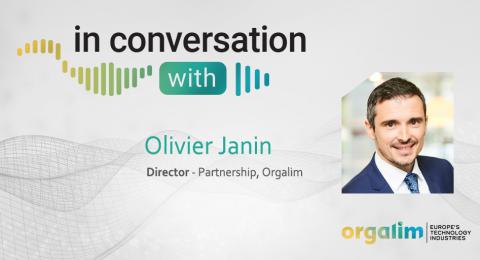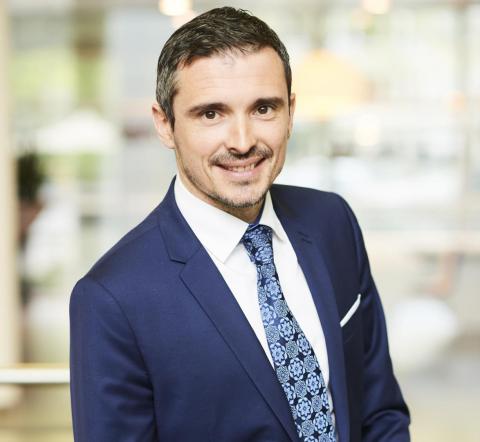In conversation with Olivier Janin
6 February 2020

For over 15 years, Orgalim’s Partnership department has provided tailored services to European sector associations within the technology industries. We sat down with Partnership Director Olivier Janin to discuss the role of collaboration in a changing landscape, how associations can connect the worlds of industry and policymaking, and how the technology industries are undergoing not only a digital transformation but a business transformation.
What exactly is the Partnership, and how did it come into being?
Orgalim’s Partnership department provides a range of services to European sector associations, spanning regulatory monitoring, association management, business intelligence and project management. We tailor our offering to each client’s requirements, giving them access to the broad spectrum of skills within our team.
The Partnership was created in the late 1990s at a time when these sector associations were adapting to a new environment. Founded to support technical collaboration, they suddenly needed to add a regulatory dimension to their activities as the creation of the Single Market in the 1990s meant the rules governing their products were now made in Brussels. So it made sense for them to relocate here, and Orgalim was ideally placed to support them in this move: on the one hand, the broad industry coverage of our membership meant we had the right expertise; on the other hand, working with these organisations on our shared priorities could reinforce the Orgalim network. So that is how the Partnership started, from small beginnings of three association clients to the 22 we serve today.
The services you offer are similar to that of a consultancy – what makes the Partnership different?
First and foremost, we only work with European sector associations within the technology industries. This defined scope gives us both a high level of expertise on relevant policies and an in-depth understanding of issues specific to technology companies – something that is pretty much unique in Brussels. Moreover, as a not-for-profit organisation completely integrated within Orgalim, we know the association world inside-out and are not primarily motivated by commercial considerations as a consultancy might be.
Not only are the technology sectors incredibly high-tech and broad in their scope; they are also a real driving force for human progress and our ability to provide solutions to many of the challenges society is facing today
You have been working with the technology sectors at Orgalim since 2008 – what is the most surprising thing you have learned about the industries?
Honestly, what has surprised me most is just how exciting and dynamic our industries are. My background is in law and public affairs, so I had no prior knowledge of the sectors Orgalim represents when I started working here in 2008. And I have to admit, my preconception was rather a ‘nuts and bolts’ image of factories and noisy, oily machines. But I quickly realised nothing could be further from the truth: not only are the industries incredibly high-tech and broad in their scope; they are also a real driving force for human progress and our ability to provide solutions to many of the challenges society is facing today. To see the incredible innovation happening in areas like climate, energy or digital technology and witness the societal responsibility of these companies – that really inspires me.
What are the most exciting cross-cutting trends you have seen emerging across the technology sectors in recent years?
Related to what I just mentioned, one thing I have really seen change in the past few years is that the industry is becoming much more mindful of its social and environmental footprint. And this is a change that is happening at all levels and in companies of all sizes.

Of course the digital transformation is also revolutionising our industries, although the pace of change varies from sector to sector. An important trend here is a fundamental shift in the nature of business models. If I take the materials handling sector, today it would still call itself primarily a manufacturing industry, but I don’t know how long this will continue to be the case. Thanks to digitalisation and servitisation, these companies no longer only manufacture equipment but rather they provide integrated solutions to address complex logistics needs – in some cases, they may not even sell physical products at all. So while we always talk about ‘digital transformation’, I think these disruptive trends are fuelling a more fundamental ‘business transformation’ that is even more far-reaching.
Turning towards the policy side of the Partnership’s activities: what are the big priorities you see emerge through your work with the sectors, and how do these compare with the priorities among Orgalim’s national member associations?
More often than not there is a complementarity between policy positions emerging at the level of Orgalim’s national member associations and the work of the sectors. From digital and innovation, to internal market and technical legislation, or energy, climate and environment – plenty of the objectives are shared; it is just about making sure our industries work well together and reinforce each other’s messages. So it’s not that there are necessarily different priorities but rather different levels – from technical through to political – that complement each other in their interaction.
How do Orgalim’s Partnership and policy departments work together?
It is a two-way relationship. We benefit from the regulatory intelligence coming from our colleagues on the policy side, while we bring to their work the more direct link to our industries – as companies tend to be much more directly present in the sector associations. This is really important because while national associations are the first interlocutors in Orgalim and in many sector associations, ultimately companies are the reason we are here. Maintaining close links with the industry on the ground is something the Partnership can help with.
Another important aspect of how we work together is the network factor: we try to reinforce common positions across the network as far as possible, and we try to foster compromises and communication in instances where positions differ.
Disruptive trends, like digital transformation, are fuelling a more fundamental business transformation that is even more far-reaching
And how do you work together within the Partnership team?
When I started 12 years ago there were just 5 of us; today we are 13. Our team brings together diverse profiles and skill sets: some are more focused on particular policy areas; some are more involved with association management – so not only lobbying but also the statutory and financial aspects of running an association; and some take care of the varied administrative work that spans events, legal and financial topics. What I’m really proud of is how well we work together as a team, both within the Partnership and with our colleagues across Orgalim. Balancing many different clients and deadlines can be challenging, but it’s also exciting – and the collaborative atmosphere makes it a lot of fun, too.
Find out more about the services offered by Orgalim’s Partnership team here.